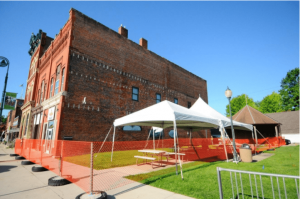Article By: Laura Qualey
Cannon Falls prides itself on the local producers and recreation available in their community. This past October, Laura Qualey, Economic & Community Development Specialist for CEDA and the Economic Development Authority in Cannon Falls, launched a website and social media platforms focused on their local foods initiative called Cannon Roots. Qualey was also part of the brand creation process before she had started working with CEDA for the community.
Back in 2014, five local food producers in Cannon Falls attended the FEAST! Local Foods Marketplace Event in Rochester. At the time, someone had mentioned that Cannon Falls had good representation for local foods and they made a comment that Cannon Falls seemed to be the “local food capital of Minnesota”. That simple comment got the ball rolling.
With some grant funding and matching dollars from the Economic Development Authority in Cannon Falls, the Cannon Roots brand was created. Two other CEDA team members, Courtney Bergey Swanson and Nicholas Ouelette, were recruited once the brand was created to determine how the brand could be used to help promote the local foods initiative.
The brand is that it is dedicated to all things local. From the award-winning Cannon River Winery and CannonBelles Cheese, to Tilion Brewing Company, Ferndale Turkey, Sweet Harvest, Churchill Reserve Grass-fed Beef, Lorentz Meats, Santa Martha Café coffee bean roaster, pet food company Raw Bistro, and most recently added Minny Grown; Cannon Roots is all about showcasing the local flavors and experiences you can have while in Cannon Falls.
Tourism plays a huge part in the economic success of the area, so that is why Cannon Roots brand also features the adventures you can have during your trip to the town. There is the Mill Towns State Trail that connects to the Cannon Valley Trail as well as the Cannon River, Lake Byllesby and also Welch Ski Village that is only seven miles away! Cannon Roots has also partnered with SHRPA which is a platform that helps you find entertainment and share things to do within your community. Cannon Roots has their own personal ‘Sherpa’ or ‘influencer’ that creates adventures in the Cannon Falls community and partners the adventures with local food experiences.
So whether you’re looking for a fun way to spend the day, weekend or a lifetime, it’s worth experiencing the Cannon Roots that makes Cannon Falls so special.

